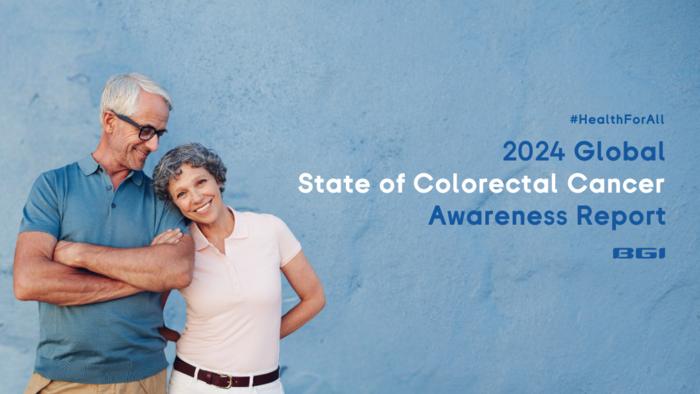According to the statistics of the Saudi National Cancer Registry issued by the Saudi Health Council for 2020, colorectal cancer (CRC) is ranked second among types of cancer, and first in men and third in women accounting for 12.3% with 1729 cases among all registered cancer cases. By 2040, CRC is projected to reach 3.2 million new cases globally and 1.6 million deaths annually, a 66% and 71% increase from 2020.

Credit: BGI Genomics
According to the statistics of the Saudi National Cancer Registry issued by the Saudi Health Council for 2020, colorectal cancer (CRC) is ranked second among types of cancer, and first in men and third in women accounting for 12.3% with 1729 cases among all registered cancer cases. By 2040, CRC is projected to reach 3.2 million new cases globally and 1.6 million deaths annually, a 66% and 71% increase from 2020.
To better address the global burden of CRC and reduce its impact, BGI Genomics has launched the second edition of its global CRC awareness report, covering 1,938 respondents from Brazil (306), China (367), Poland (300), Saudi Arabia (300), Thailand (362), and Uruguay (303):
CRC Screening Gaps Vary Globally: A significant 49.3% of global respondents never had a CRC screening test, Saudi Arabia (62.0%) with the highest proportion. In addition, 39.7% Saudis believe there’s not enough information available to assess their own CRC risk.
Preference for Fecal Testing Over Colonoscopy: Although colonoscopies are more recognized (33.4%), fecal tests at healthcare facilities are preferred (31.8%), reflecting a trend towards non-invasive methods.
Fear is the main Barrier for CRC Screening: Fear of colonoscopy influences 19% of Saudis, higher than the global average of 18.2%. Different from the globe, cost is the least influencing factor in Saudi Arabia. 65% of Saudis prefer moderately priced (US$50 – $200) and higher priced (over US$200) screening services, with 16.3% opting for higher-priced options, surpassing the global average of 14.1%.
Family History Drive CRC Screening: Around 85% of Saudis are more willing to undergo screening after learning that early detection of CRC results in a relatively higher survival rate. 74.1% of Saudis with CRC or a family history of CRC have taken their family members for screening, compared to only 27% of all Saudi respondents.
Prof. Varut Lohsiriwat from Mahidol University offers his insights to this report. He suggested: “The essence of effective cancer screening lies in the acceptance and adherence of the patient to the screening method. The best screening method is the one that the patient accepts and adheres to because that’s the method that will actually benefit them.”
Dr. Zhu Shida, BGI Genomics Deputy GM, notes: “At BGI Genomics, we focused our efforts on developing advanced molecular biology testing techniques to close the gap [between acceptance and accessibility]. The ultimate goal is to transform colorectal cancer from a life-threatening disease into a manageable condition through widespread, early screening and intervention.”
For more region-level comparisons, access the full BGI Genomics 2024 State of CRC Awareness Report.
All data involved in this report come from the results of an online survey project conducted by BGI Genomics. It only surveys awareness related to colorectal cancer and does not involve personally identifiable data.
About BGI Genomics and COLOTECT
BGI Genomics, headquartered in Shenzhen, China, is the world’s leading integrated solutions provider of precision medicine. In July 2017, as a subsidiary of BGI Group, BGI Genomics (300676.SZ) was officially listed on the Shenzhen Stock Exchange.
COLOTECT is a non-invasive fecal DNA test developed by BGI Genomics for detecting CRC and precancerous lesions. It uses multiplex methylation-specific PCR (MSP) technology to trace abnormal DNA-methylation biomarkers in CRC from stool samples. It has 88% CRC sensitivity, and for early detection, its sensitivity for advanced adenoma is 46%, which are both superior to conventional fecal tests.



